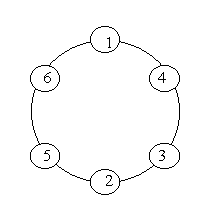Prime Ring Problem
Time Limit: 4000/2000 MS (Java/Others) Memory Limit: 65536/32768 K (Java/Others)
Total Submission(s): 32717 Accepted Submission(s):
14482
Problem Description
A ring is compose of n circles as shown in diagram. Put
natural number 1, 2, ..., n into each circle separately, and the sum of numbers
in two adjacent circles should be a prime.
Note: the number of first circle should always be 1.

Note: the number of first circle should always be 1.

Input
n (0 < n < 20).
Output
The output format is shown as sample below. Each row
represents a series of circle numbers in the ring beginning from 1 clockwisely
and anticlockwisely. The order of numbers must satisfy the above requirements.
Print solutions in lexicographical order.
You are to write a program that completes above process.
Print a blank line after each case.
You are to write a program that completes above process.
Print a blank line after each case.
Sample Input
6
8
Sample Output
Case 1:
1 4 3 2 5 6
1 6 5 2 3 4
Case 2:
1 2 3 8 5 6 7 4
1 2 5 8 3 4 7 6
1 4 7 6 5 8 3 2
1 6 7 4 3 8 5 2
和nyoj上的素数环做法一样
#include<stdio.h>
#include<string.h>
#define MAX 21
int a[MAX];
int vis[MAX];
int prime[50];
int k;
void biao()
{
int i,j;
for(i=0;i<=50;i++)
prime[i]=1;
for(i=2;i<=50;i++)
{
if(prime[i])
{
for(j=2*i;j<=50;j+=i)
{
prime[j]=0;
}
}
}
prime[1]=0;
}
void dfs(int cur,int n)
{
int i,j;
if(cur==n+1&&prime[1+a[n]])
{
for(i=1;i<=n;i++)
{
if(i==1)
printf("%d",a[i]);
else
printf(" %d",a[i]);
}
printf("
");
}
else
{
for(i=2;i<=n;i++)
{
if(!vis[i]&&prime[i+a[cur-1]])
{
a[cur]=i;
vis[i]=1;
dfs(cur+1,n);
vis[i]=0;
}
}
}
}
int main()
{
int n,m,j,i,t;
biao();
k=1;
while(scanf("%d",&n)!=EOF)
{
memset(a,0,sizeof(a));
memset(vis,0,sizeof(vis));
a[1]=1;vis[1]=1;
printf("Case %d:
",k++);
if(n==1)
printf("1
");
else
dfs(2,n);
printf("
");
}
return 0;
}